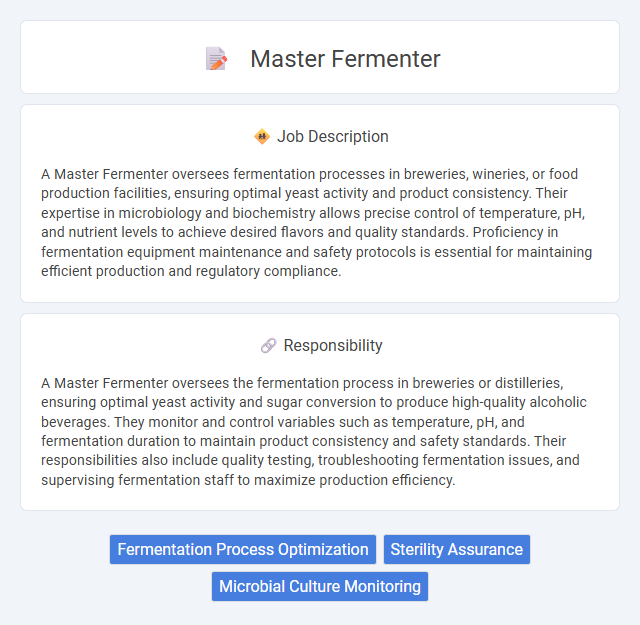
A Master Fermenter oversees fermentation processes in breweries, wineries, or food production facilities, ensuring optimal yeast activity and product consistency. Their expertise in microbiology and biochemistry allows precise control of temperature, pH, and nutrient levels to achieve desired flavors and quality standards. Proficiency in fermentation equipment maintenance and safety protocols is essential for maintaining efficient production and regulatory compliance.
Individuals with a keen interest in microbiology and a methodical approach to precision are likely to be well-suited for a Master Fermenter role. The position probably demands strong attention to sanitary conditions and the ability to monitor fermentation processes closely, which might not be ideal for those uncomfortable with routine lab work or strict quality controls. People who thrive in collaborative, process-driven environments and can manage physical tasks related to brewing or fermentation are more likely to succeed in this field.
Qualification
A Master Fermenter oversees the fermentation process in breweries or food production, requiring extensive knowledge of microbiology and biochemistry. Candidates typically hold a degree in food science, microbiology, or chemical engineering, with hands-on experience in fermentation technology and quality control. Proficiency in analytical techniques, process optimization, and regulatory compliance is crucial for maintaining product consistency and safety.
Responsibility
A Master Fermenter oversees the fermentation process in breweries or distilleries, ensuring optimal yeast activity and sugar conversion to produce high-quality alcoholic beverages. They monitor and control variables such as temperature, pH, and fermentation duration to maintain product consistency and safety standards. Their responsibilities also include quality testing, troubleshooting fermentation issues, and supervising fermentation staff to maximize production efficiency.
Benefit
A Master Fermenter likely provides the benefit of ensuring consistent and high-quality fermentation processes, which can improve product flavor and safety. Their expertise probably reduces production errors, leading to cost savings and higher efficiency. Companies may experience increased customer satisfaction and brand loyalty as a result of their specialized knowledge.
Challenge
The role of a master fermenter likely involves managing complex biological processes that require precise control and constant monitoring, which may present significant technical challenges. Ensuring batch consistency and avoiding contamination could be ongoing concerns demanding both expertise and adaptability. Success in this position probably depends on problem-solving skills and the ability to respond quickly to unexpected fermentation issues.
Career Advancement
Master fermenters lead the fermentation process in industries like brewing, pharmaceuticals, and food production, harnessing expertise in microbiology and biochemical engineering. Career advancement opportunities include moving into senior production management, research and development leadership, or quality assurance director roles, leveraging proficiency in process optimization and regulatory compliance. Continuous education in fermentation technology and certifications in process control enhance prospects for higher-level strategic and innovation-driven positions.
Key Terms
Fermentation Process Optimization
Master fermenters specialize in fermentation process optimization, ensuring maximum yield and product consistency by fine-tuning parameters such as temperature, pH, oxygen levels, and nutrient supply. They utilize advanced bioreactor control systems and analytical techniques to monitor microbial growth and metabolite production in real-time. Expertise in optimizing fermentation cycles enhances efficiency in pharmaceuticals, brewing, and biofuel industries by reducing costs and improving product quality.
Sterility Assurance
Master fermenters ensure sterility assurance by rigorously monitoring and maintaining aseptic conditions throughout the fermentation process to prevent microbial contamination. They implement robust sterilization protocols for equipment, culture media, and bioreactors, ensuring compliance with GMP and industry regulations. Continuous environmental monitoring, validation of sterilization cycles, and document control are critical tasks performed to uphold product purity and safety standards.
Microbial Culture Monitoring
Master fermenters specialize in microbial culture monitoring to ensure optimal growth conditions and maximize yield in industrial fermentation processes. They utilize advanced analytical techniques to track microbial metabolism, pH levels, temperature, and oxygen concentration, maintaining sterile environments to prevent contamination. Precision in monitoring microbial cultures directly impacts product quality, consistency, and scalability in biopharmaceutical and food production industries.
 kuljobs.com
kuljobs.com